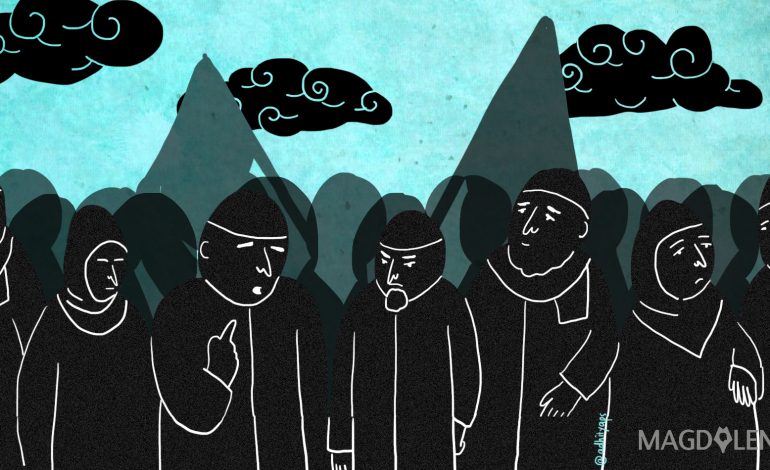Do not Let the Extremists Control All Aspects of Our Lives: Experts

The United States and Indonesia are two of the most religiously diverse countries in the world. However, religious diversity has always had the potential to be either beneficial or problematic for countries, depending upon how well the government and civil society can uphold principles of tolerance and respect among different religious groups.
Tensions between religious majority and minority groups have always been present in both countries. In both the US and Indonesia in the past year, political campaigns have successfully used messaging against minority religious groups to mobilize society and gain political support.
A number of non-profit institutions of Indonesia and the United States held an open forum titled Relations between Religions Majorities, Minorities, and the State in United States & Indonesia: Current Trends and Issues at Jakarta Design Center in July 31.
The event was initiated by USINDO, Indonesia – US Council on Religion & Pluralism, SETARA, and Wahid Institute.
The seminar featured Prof. Brett Scharffs from Brigham Young University USA, Yenny Wahid from Wahid Institute, Dr. Ferimaldi representatives of the Ministry of Religious Affairs, and Febi Yonesta Head of Organizational Development Indonesian Legal Aid Foundation (YLBHI).
At the forum, the speakers discussed various issues such as religious life and their relations with the state, frictions between majority and minority religions, sentiments of radicalism and extremism, religious politicization, pluralism and tolerance, and discrimination and violence against believers.
“Indonesia has the highest ranking, according to one of the global survey, on the importance of religion in a society. So, for Indonesians, religion is one of the key things in life. That’s how deep people feel about religious sentiment here,” said Yenny.
The daughter of the late President Abdurrahman Wahid also explained that in Indonesia, religion is vulnerable to be exploited by several groups as a tool to achieve certain political goals.
Wahid Institute’s survey in 2015, 0,4 percent of Indonesian have committed radical action, while 7,7 percent, which is equal to 11 million people, are willing to do radical acts in the future.

“I am often asked about the Ahok case, and I think Ahok case is almost the same as the US Election in 2016. When populist sentiments and religious sentiments are used for political purposes, the blasphemy case is only a mechanism related to the political dynamism that occurs in a country,” explained Yenny.
“It’s easy to understand why religion then managed to be used in such a way for political purposes. And in my opinion, this will not be the last case of religious issue for political purpose. Ahok’s case serves as a wakeup call to the large society. It’s time for the silent majority to make noise,” she added.
Yenny also explained that based on a Wahid Institute’s survey in 2015, 0,4 percent of Indonesian have committed radical action, while 7,7 percent, which is equal to 11 million people, are willing to do radical acts in the future.
Sense of deprivation and alienation have strong influence. Exposure to hateful acts also influence tendency to be radical.
“Radicalism can happen anywhere. So if you feel that something has to be corrected in the system, then you’ve got a tendency to do something,” she said.
Meanwhile, in the US context, according to Prof. Brett Scharffs, the issue of religious life in the US is dominated by three main issues, namely the struggle of minority religious groups, government policies targeting minority religious groups, and friction between the human rights community and religious communities.
Donald Trump’s US Travel Donations Policy is the centerpiece of attention to the relationship of religious life with the State. The country has banned citizens from certain Muslim-majority countries from coming to the United States.
“Such sentiments were used by Trump in the last election, but Trump is not aware of the real issue of Muslims. If he associates Muslims with terrorism, the projection is not correct. There are many other solutions that are far better than Travel Ban to face the issue of religion and terrorism,” explains Scharffs.
“In the US there are also frictions between human rights groups, especially gay rights activists, and a number of religious communities, as well as debates and oppositions related to freedom of expression and freedom of religion,” he added.
To deal with a number of these problems, Yenny and Scharffs offer a number of ideas as solutions.
“The most important thing is that all individuals and groups of the majority must do away with the attitudes and desires to dominate the minority. This is the root of discrimination, violence and hatred among people that can trigger radical and extremist attitudes,” explained Yenny.
“Related to radicalism and extremism, do not let them control all aspects of our lives in Indonesia. Do not give them space to move and make them a center of attention. We also have to keep the youths from being influenced by that understanding,” she said.
“And last, we need political cost and effort from the government to deal with these issues,” Yenny added.
Meanwhile, in a more general context, solutions offered by Scharffs include responsible freedom, socialization of tolerance and pluralism, to maintaining ethics in religious life.
“We need socialization among religious people, we must also exercise responsible freedom, do not abuse that right,” said Scharffs.
“Every religious believer should respect and keep their ethics to others, treat others as you would like to be treated. If you do not like your religion to be shamed, then do not despise the religion of others,” added the professor.






















